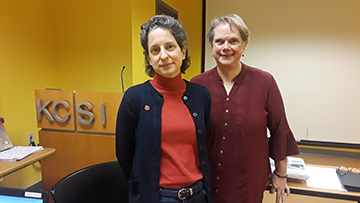John already had a job but it was time for a step up from washing dishes. The Keystone Correctional Services employment coordinator told him about a forklift operator position — and John pursued it by using a Dauphin County Library System laptop to apply online.
In a unique partnership, The Library regularly sends staff equipped with laptops and Wi-Fi to Keystone Correctional Services, Inc., a residential work-release program in West Hanover Township Reentrants transitioning from parole and prison learn computer skills and get help writing resumes, applying for jobs, and sending emails, on their way to reestablishing themselves in their communities.
“I know the basics, but I need to get up to date on computers,” John says. “I can check my emails. The Library people are very helpful for me and all the guys that come out for this.”
The partnership started in 2017 when Patricia Snyder, a volunteer for The Library and for Keystone Correctional Services, saw a need. Reentrants often visited The Library to use the computers, but some didn’t know how to use them as job-search tools.
Teaching skills, providing opportunities
“We’re willing to look outside the box to provide skills and opportunities,” says Amanda Price, Keystone’s Chief Operating Officer, adding about 300 reentrants have taken advantage of the program so far. “We’ve always been huge advocates encouraging reentrants to go to The Library themselves to get on the computers and look for jobs.”
Now, The Library’s staffers trained in computer basics and equipped with Pennsylvania Department of Corrections clearances arrive every other week with laptops and handouts on The Library’s resources. The initiative delivers cyber connections and teaches skills essential to functioning in today’s economy.

On a recent Wednesday morning, five reentrants sat quietly at laptops while Information Services Assistant Ann Marie Megoulas and Circulation Manager Assistant Valerie Swangren assisted.
“It gives these guys access to things they need that they might not get,” says Swangren. “We have resources that we can help them. They don’t always need them, but when they do, we’re here.”
“And it introduces them to services available in-house at the library so they can take advantage after they leave here,” adds Megoulas.
Currently, about six of The Library’s staffers rotate in pairs through the sessions. They might help reentrants renew driver’s licenses, file taxes, or apply for library cards. One reentrant who was thinking of starting a business received guidance on entrepreneurship.
At each session, reentrants get individualized assistance, perhaps writing a resume or creating a professional email address – a little detail that can give reentrants an advantage in contacting future employers about jobs.
Lifting barriers to employment
Some reentrants need the basic computer skills that they weren’t able to build over many years of incarceration. When an employer once initiated a mass hiring, all those job applications were filed during The Library’s next session, says Jan Cassell, Keystone’s employment coordinator.
“In employment, everything is online right now,” Cassell says. “Ninety-nine percent of job applications are online.”
Founded in 2009, Keystone Correctional Services houses up to 150 male reentrants, under a contract with the Pennsylvania Department of Corrections. Today, it is Pennsylvania’s only contract work-release facility with an employment coordinator on staff. Relationships forged with local employers and community groups tear down barriers to employment.
“The more agencies and community organizations that help these men, the better chance they have of getting to where they need to be,” says Terry L. Davis, Keystone’s president and CEO. “The Library is a great partner. My guys had been going to The Library and getting on the computers, anyhow. This allows us to teach them how to use them.”
At Keystone Correctional Services, “if you need the help, they’re there to back you up,” says John, the forklift-operator hopeful.
“The Library’s staff and their laptops are very helpful,’’ John says. “I come twice a month. I did my taxes last time. Everything worked out fine.”
“The program between The Library and Keystone is just one of the many ways Keystone is helping ex-offenders get a new start,” Davis said.
“What a wonderful feeling to hear John talk about his attitude and the vision he now has that would not have happened without the relationship that has now occurred with John, Mrs. Cassell at Keystone and The Library,’’ Davis said.
“When we can help our guys get the self-esteem necessary to give them the confidence to change their behavior,’’ Davis said, “we see a different man then the one who came to us.”



